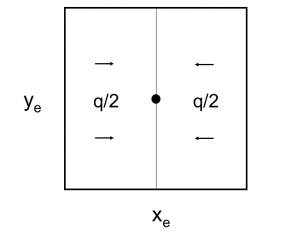Difference between revisions of "4/π stimulated well potential"
From wiki.pengtools.com
(→Nomenclature) |
(→Nomenclature) |
||
| Line 36: | Line 36: | ||
:<math> A </math> = cross-sectional area | :<math> A </math> = cross-sectional area | ||
| + | :<math> A </math> = oil formation volume factor | ||
| + | :<math> h </math> = thickness | ||
:<math> k</math> = permeability | :<math> k</math> = permeability | ||
:<math> x </math> = length | :<math> x </math> = length | ||
| + | :<math> x_e</math> = drinage area length | ||
| + | :<math> y_e</math> = drinage area width | ||
:<math> P </math> = pressure | :<math> P </math> = pressure | ||
| + | :<math> P_i </math> = initial pressure | ||
| + | :<math> \bar P</math> = average pressure | ||
:<math> q </math> = flow rate | :<math> q </math> = flow rate | ||
Revision as of 10:09, 10 September 2018
Brief
4/π is the maximum possible stimulation potential for steady state linear flow in a square well spacing.
Math & Physics
Steady state flow boundary conditions:
From Darcy's law:
Integration gives: 
Since average pressure is: 

See also
optiFrac
fracDesign
Production Potential
Nomenclature
 = cross-sectional area
= cross-sectional area = oil formation volume factor
= oil formation volume factor = thickness
= thickness = permeability
= permeability = length
= length = drinage area length
= drinage area length = drinage area width
= drinage area width = pressure
= pressure = initial pressure
= initial pressure = average pressure
= average pressure = flow rate
= flow rate
Greek symbols
 = oil viscosity
= oil viscosity







